Events that defined 2017
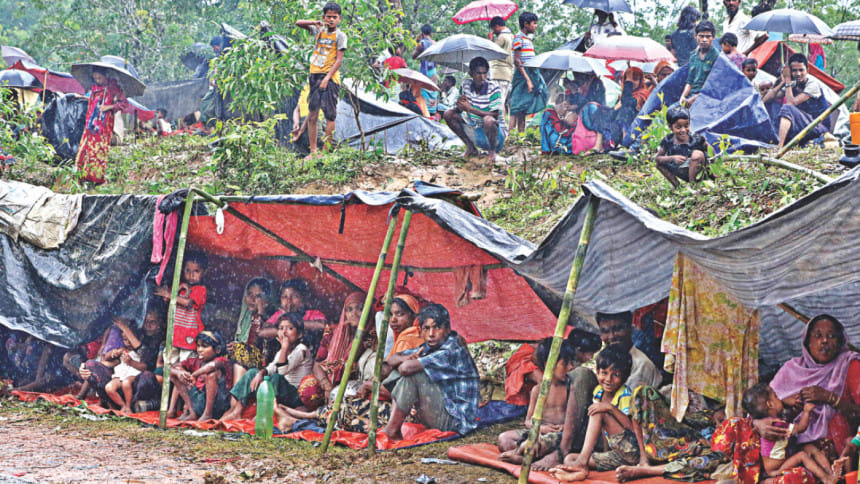
DEVASTATION IN THE WAKE OF FLOODS
In March, a punishing flood left haor areas across Sylhet and adjacent districts completely devastated. Subsequently, floods hit 32 districts—including low-lying northern ones—claiming dozens of lives, resulting in acute water and food crisis.
While water resource minister, Anisul Islam, echoed the statements of local officials claiming that rats were to blame for the collapse of dams that exacerbated floods in that region, the Anti-Corruption Commission (ACC) sued 61 people, including engineers of Bangladesh Water Development Board and contractors, for purposeful mismanagement and corruption in the construction of dams.
Flash floods caused significant damage to Boro crops across the country, as more than six lakh hectares of agricultural land were submerged. Many blamed the floods for the subsequent rice crisis. In June, The Daily Star reported that the country saw 42 percent rise in rice price in a year. The crisis forced the food ministry to take steps to import rice from Myanmar, in spite of strains in bilateral relations due to the recent Rohingya influx.
In addition, floods halted academic activities in thousands of educational institutions in north and northeastern districts, affecting several lakh students.
JUDICIARY: NOTABLE RULINGS
Last year, Narayanganj district court condemned 26 convicts—including former RAB officials—for their involvement in the infamous seven-murder case in the district.
Four convicts were awarded the death sentence for ruthlessly killing Rajon, a teenage boy in Sylhet, whose death sparked outrage across the country.
The High Court in May declared that mobile court led by magistrates was illegal—an issue that strained judiciary-executive relations. Also in May, the Supreme Court upheld the life sentence of Delwar Hossain Sayeedi, the Jamaat leader and cleric, for committing crimes against humanity during the liberation war in 1971.
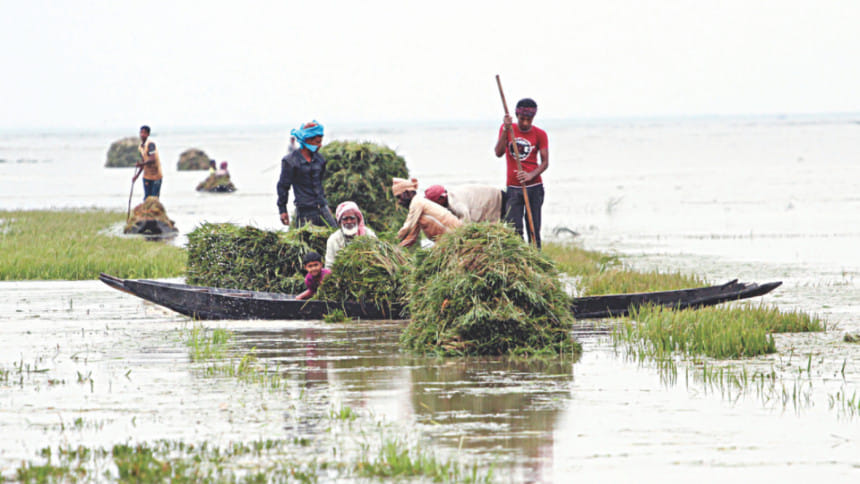
In August, the apex court asked the government to return tax collected by intelligence agencies during the tenure of the last caretaker government. In yet another landmark ruling, the High Court asked the concerned parties such as the government and insurers to pay Tk 4.61 crore in compensation to the family of Tareque Masud, a noted filmmaker who had been killed in a road accident in 2011, paving the way for getting compensation for victims of road accidents. In February, the apex court awarded the life sentence to the bus driver who caused the accident.
The High Court in August declared illegal and void the two deals Niko Resources Bangladesh Limited signed with Bapex and Petrobangla during the last BNP-led government, as those had been procured through corruption.
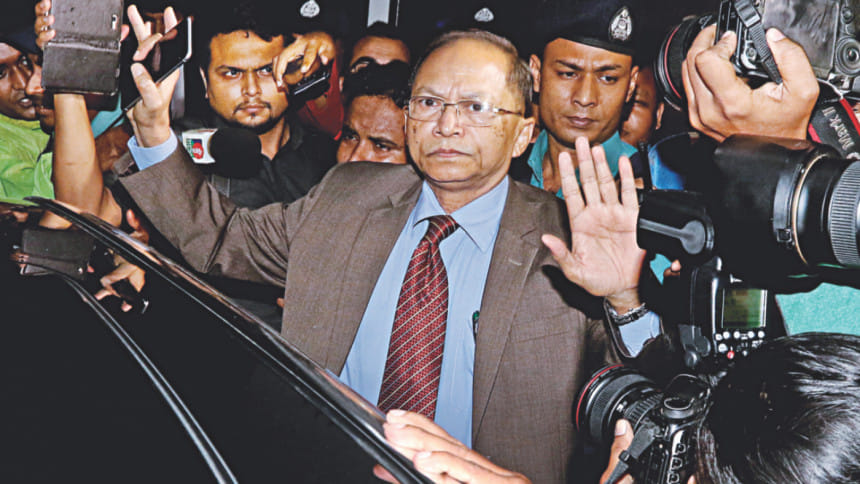
THE SINHA SAGA
Surendra Kumar Sinha, the former chief justice, had been vocal about issues of judicial independence. Throughout his tenure, the relations between the judiciary and the executive branch of government were tense, especially over the issue of the gazette notification on the rules determining the disciplines and code of conduct for lower court judges. (After his departure, in December, the law ministry finally issued the gazette notification, keeping the power to appoint and remove lower court judges in the hands of the president and the executive branch.)
On many issues, Mr Sinha often traded heated words with the attorney general. However, the ruling party responded sharply when the apex court nullified the 16th Amendment to the Constitution, which had granted the parliament power to remove sitting judges. In particular, the-then chief justice found himself in hot water because of a sentence in his judgment: “No nation – no country is made of or by one person.” The pro-ruling party voices alleged that by writing this sentence, the chief justice questioned the leadership of Bangabandhu Sheikh Mujibur Rahman in the Liberation War. He denied it. The situation was exacerbated when he cited the Pakistani judiciary's removal of the country's prime minister as an example of how judicial decisions should be respected by the political establishment. Subsequently, Mr Sinha “applied” to go on leave for one month on health grounds—something critics alleged he was coerced to do. While on his way to the airport to Australia, in an unforeseen move, he told reporters that he was not ill, contradicting the law minister. He also accused the government of interfering with the judiciary.
After one month, he did not return as promised to resume his role as chief justice. Instead, he was said to have sent his resignation letter—an unprecedented incident in the history of Bangladesh— from abroad. Meanwhile, the government brought up a number of charges— including corruption, money laundering, and moral aberration—against him. However, the government did not appear to pursue these charges once he resigned.
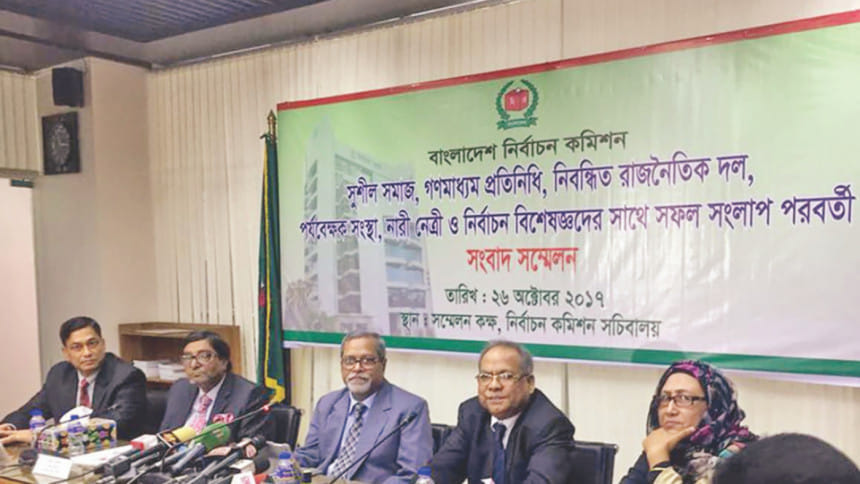
A NEW ELECTION COMMISSION
As the tenure of the last Election Commission expired in February 2017, a new Election Commission was formed to conduct the next general election to be held in 2019. Twenty-six registered political parties proposed 100 names from which 20 names were primarily shortlisted by the search committee for reconstituting the five-member Election Commission. Subsequently, the new Election Commission was formed on February 6, 2017 and KM Nurul Huda, a former secretary, was appointed as the chief election commissioner.
After the formulation of the new Election Commission, the prime minister said in parliament that an initiative could be taken to formulate an “appropriate law” in light of the Constitution to appoint the CEC and election commissioners the next time. She also expressed her opinion in favour of introducing the e-voting system.
The BNP, however, wrote to CEC urging not to use EVM in the next JS polls as the party believed that EVM would lead to digital rigging in the election. Later, during its dialogue with the Election Commission, BNP proposed the dissolution of parliament and a polls-time “supportive government” to oversee the next election. In addition, it also proposed for deployment of the army with magistracy power. While the ruling Awami League insisted that the elections would be conducted as per constitutional provisions, at least 25 out of 40 parties that talked with the EC since August 25 also demanded deployment of army during the election.
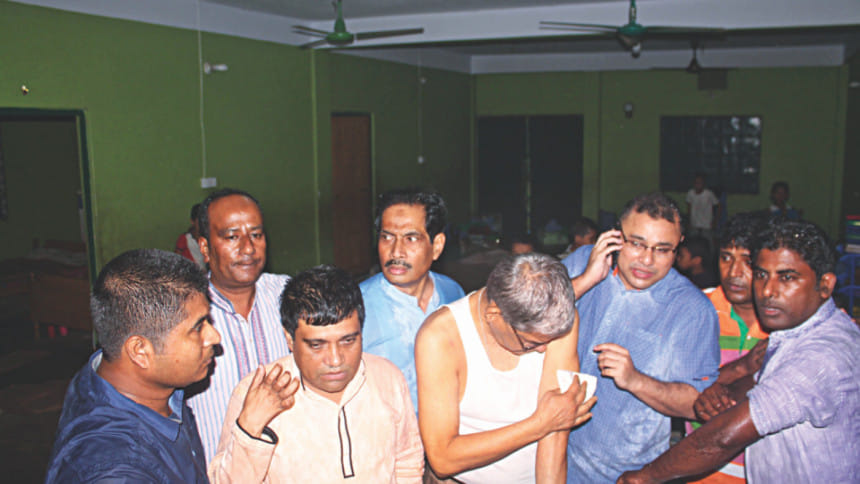
BNP'S PRESENCE IN THE POLITICAL SCENE
Ahead of the election to be held in 2019, the main opposition party BNP took up some political programmes which were met with resistance from the government. The party in May 2017 unveiled a 256-point vision paper that it called “Vision 2030,” in which it revealed a long-term plan for the country's governance and economic development. However, Awami League General Secretary Obaidul Quader alleged that the BNP stole the idea from AL's “Vision 2021” and said that it was nothing but “a joke and an attempt to deceive the nation.” According to BNP, if this vision is implemented, the country's per capita income will rise to USD 5,000 from current USD 1,466, and it will achieve a double-digit annual growth rate by 2030.
In May 2017, police raided Khaleda Zia's Gulshan office to seize “materials for carrying out anti-state and subversive activities” but they found nothing during the over-two-hour-long search. The party leaders termed the move as “provocation by the government” and it was aimed at spoiling the “election atmosphere.”
BNP Chairperson Khaleda Zia's motorcade was attacked in Feni when she was heading towards Cox's Bazar to visit the Rohingya refugee camps on October 28. At least 45 people were injured and some 30 vehicles damaged in the incident. Nearly 15 journalists were also assaulted. Earlier in June, BNP Secretary General Mirza Fakhrul Islam Alamgir's motorcade also came under attack in Chittagong's Rangunia when he was en route to visit the landslide-affected areas in Rangamati. Mirza Fakhrul termed the attack as “an example of the government's intolerance.”
In November, the party held a big rally at Dhaka's Suhrawardy Udyan. But many of its supporters could not come to Dhaka to attend the rally as most of the Dhaka-bound buses carrying them could not enter the city. BNP Senior Joint Secretary General Rizvi Ahmed alleged that the government suspended public transport services to bar the leaders and activists of the party and its allies from entering the city so that they could not attend the rally.
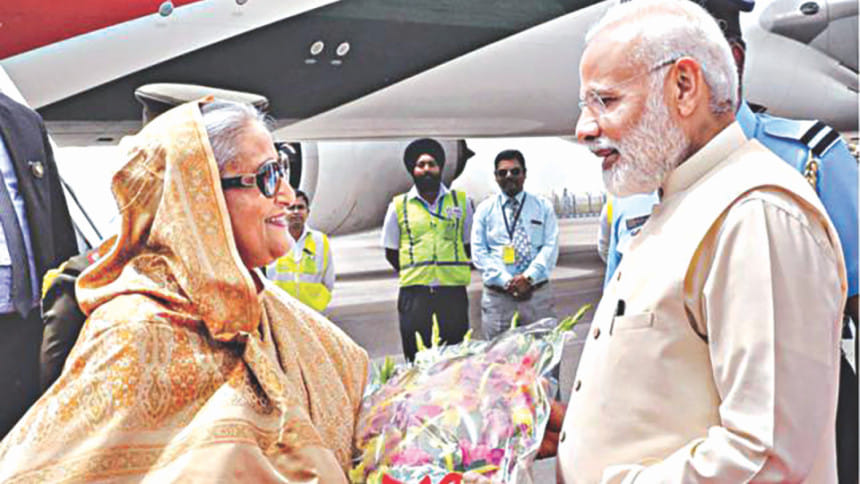
NO TEESTA WATER-SHARING DEAL
In April 2017, the prime minister’s visit to India was a disappointment for the people of Bangladesh as the much-delayed Teesta water-sharing deal was not signed. The prime minister went on a four-day state visit to India with the hope of breaking the stalemate on Teesta. However, the deal could not be signed as West Bengal Chief Minister Mamata Banerjee could not be persuaded.
Previously, the Teesta water-sharing deal was set to be signed during the then Indian Prime Minister Manmohan Singh's visit to Dhaka in September 2011 but had to be scrapped at the last minute due to Mamata's objections.
Although this time the Indian Prime Minister Narendra Modi signalled a quick solution to this issue, the reality on the ground was different. Coming out of a meeting held between Mamata Banerjee and Prime Minister Sheikh Hasina, Mamata told journalists that there was no water in the Teesta river to spare for Bangladesh.
However, Bangladesh and India signed six agreements and 16 memoranda of understanding (MoU) during the PM's visit.
BANKING SECTOR IN TURMOIL
The banking sector had been particularly volatile throughout last year. The turmoil began with the news that Islami Bank, the largest private bank in the country, suffered a “peaceful coup d'état,” with major changes made in its key positions including the chairman, vice chairman and managing director. The bank, long suspected as the financial backer of Jamaat-e-Islami, saw another round of change in May. Chittagong-based S Alam Group, under the auspices of the government, reportedly assumed the charge of the bank after having bought much of its shares. Proponents of the changes argued the efforts were part of the “de-Jamaatisation” process of the bank.
In a similar fashion, S Alam Group swiftly took control of Social Islami Bank in October last year. Two incidents, preceded by a similar manoeuvre in Bangladesh Commerce Bank in 2016, coupled with soaring default loans, which now constitute 10.67 percent of total distributed loans—an all-time high—raised concerns about the stability of the financial sector. The state-owned banks, in particular, are in extreme crisis.
The government also moved ahead with amending Banking Companies Act, extending the tenure of directors and doubling the number of directors in a bank's board from a single family. A number of economists and bankers, including former deputy governor of Bangladesh Bank, Ibrahim Khaled, criticised the move, saying it would hurt the interest of the depositors, and that the owning families would further consolidate their grip.
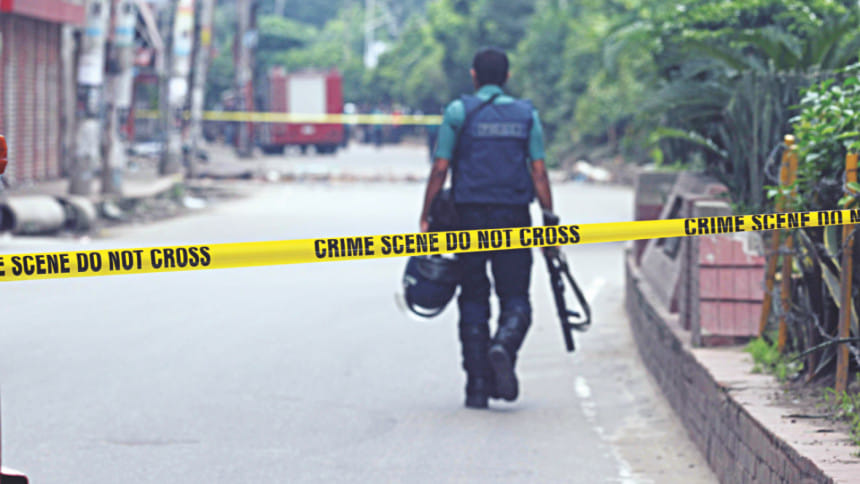
TERRORISM: YEAR OF DECLINE
While 2016 was heavily categorised as the year of growing militant activities, 2017 saw a coterie of high-profile, successful, and deadly anti-terrorism operations. With the tide of global terrorism declining and ISIS stronghold in Syria nearly diminished, the statistics of Bangladesh's domestic militancy showed a downward trend in 2017.
A top “Neo JMB” (or, the local affiliate of ISIS) leader, Nurul Islam Marzan, who allegedly coordinated the notorious Gulshan café attack in 2016, was killed in a shootout in early January.
March was the most turbulent month in the whole year. At least two attempts to attack security forces took place in March. On March 17, a man sneaked into a RAB barrack in the capital's Ashkona and blew himself up during Jumma prayers. A week later, a man was killed when a bomb attached to his waist exploded near a police box at the airport intersection. ISIS claimed responsibility for both the “suicide attacks”.
In the following days, a number of raids were conducted in suspected militant “dens”—in Dhaka, Sylhet, Comilla, Moulvibazar, and Chittagong. Operations in Sylhet even involved army personnel.
In the Moulvibazar operation, Lokman Ali, a suspected militant, killed his entire family of seven members including himself. On August 15, security forces foiled a plot to target National Mourning Day commemorations.
In September, during an anti-terror operation in Dhaka's Darus Salam area, suspected militants—at least seven—killed themselves by detonating bombs. In November, a RAB operation in Rajshahi and Chapainawabganj left three suspected militants dead.
In March, the government banned Ansar Al Islam, the al-Qaeda affiliated militant organisation that had hacked a number of bloggers, writers and publishers to death.
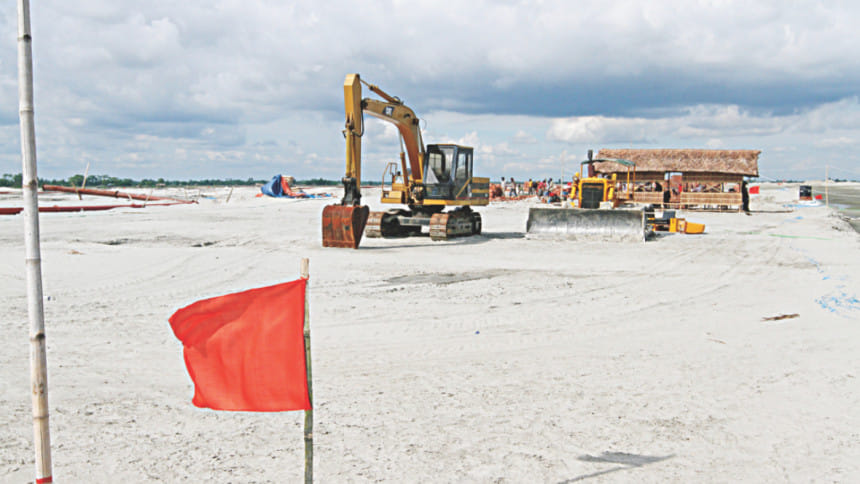
RAMPAL POWER PLANT: CONTROVERSY NOT SETTLED
The controversy surrounding Rampal power plant near the Sundarbans continued throughout most of last year. Apart from warnings of dire environmental consequences, a Greenpeace study claimed in May that the plant would cause at least 6,000 premature deaths and low birth weight of 24,000 babies during its 40-year life. Earlier, Unesco had threatened to inscribe the Sundarbans in the list of World Heritage in Danger.
In July, it was claimed, rather misleadingly, that Unesco had “lifted” its previous objections and “endorsed” the construction of the plant. Later, as the official decision came to light, it turned out that Unesco did soften its position, but remained short of lifting its objections. Though it did not specifically mention Rampal plant, it retained its position to not allow “any large-scale industrial and/or infrastructure developments” to proceed before a Strategic Environment Assessment (SEA) was submitted. Later, Unesco made it clear that “large-scale industrial and/or infrastructure developments” included the Rampal plant. Despite the clarification, Tawfiq-e-Elahi Chowdhury, prime minister's energy affairs adviser, vowed to continue with the plant's construction. UNESCO'S RECOGNITION OF
HISTORIC 7TH MARCH SPEECH
Unesco recognised Bangabandhu's historic 7th March speech as part of world's documentary heritage. On October 30, UN's top cultural body included the speech in its Memory of the World International Register, a list of world's important documentary heritage. On November 18, the government arranged a public rally to observe the recognition.
ROOPPUR PLANT: FIRST CONCRETE POURED
On November 30, Bangladesh witnessed the pouring of First Concrete of its first nuclear power plant at Rooppur, Pabna. It marked the beginning of the main construction of the plant, a Bangladesh-Russia joint project that will have two power units, each of 1200 MW capacity. Prime Minister Sheikh Hasina was the chief guest at the First Concrete pouring ceremony, while a postal stamp featuring a photo of a nuclear power plant on the background of a rising sun was released to commemorate the occasion.
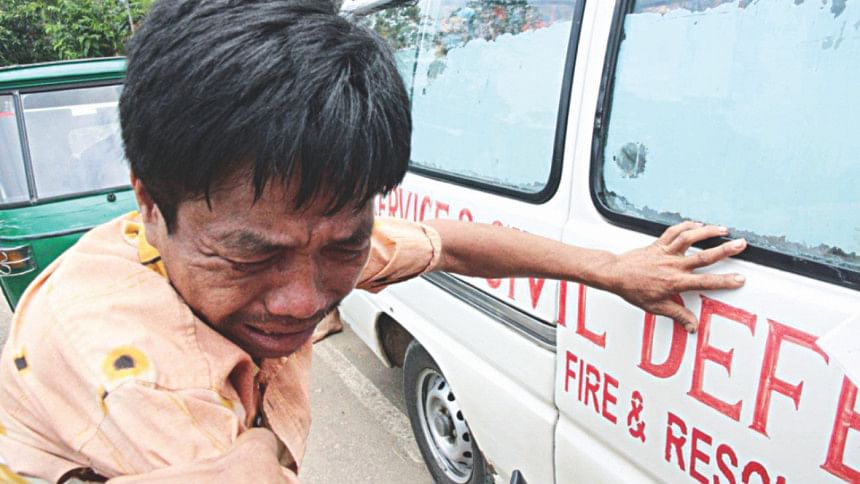
LANDSLIDES IN THE HILLS
In June 2017, at least 146 people died in the worst ever landslide since 2007 in the hilly areas of Chittagong, Rangamati and Bandarban following daylong continuous downpour. In 2007, the death toll in landslides in Chittagong was 128. Increasing settlements, destruction of forest over the years, and construction of roads without enough impact assessment were some of the causes identified for these landslides. Although the reasons were well-known to the local authorities and people in general, no steps were taken to prevent such manmade disasters.
Under the Bangladesh Environment Conservation Act 1995 (amended in 2010), cutting of hills without government approval is banned. But as this law is not implemented, hill-cutting goes on unabated making people vulnerable to landslides. According to district administration office, in Chittagong city, over 50,000 people of low-income groups live on the slopes of 30 hills and an estimated one lakh people live on hilltops and slopes in Cox's Bazar town.
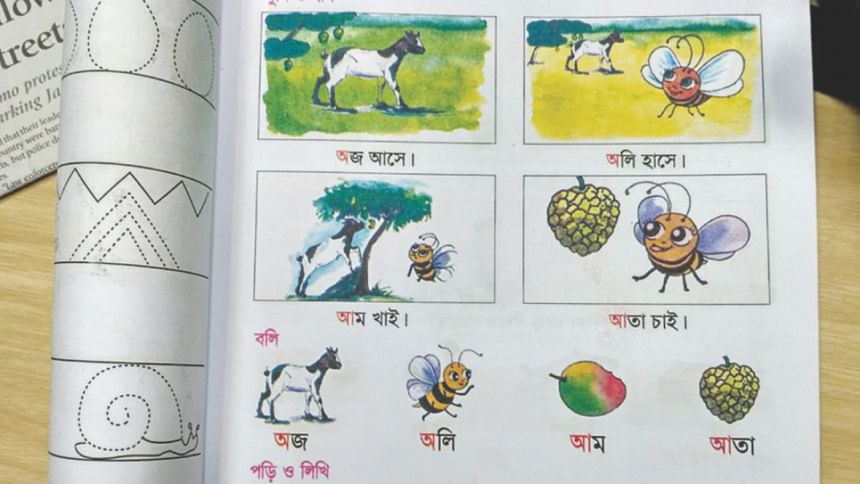
EDUCATION SECTOR: BELEAGUERED BY NEVER-ENDING CONTROVERSIES
The education sector was mired in a series of controversies in 2017. In January, the new textbooks were found to have contained numerous errors and blunders, including spelling mistakes, wrong arrangements of paragraphs, omissions of articles, etc. Particularly, a sentence in Class I's Bangla textbook—“I want a scarf (orna)”—caused a stir in social media circles. In addition, the withdrawal of some poems and prose by progressive writers and poets led many—including TIB—to allege that the government did so to appease radical groups like Hefazat who demanded those changes. The allegations gained fresh momentum when the government accorded the Dawrah-e-Hadith certificate the status of masters degree in May.
From primary school exams to Dhaka University admission tests, question paper leaks continued unabated. Many question papers of JSC and even PSC exams reportedly appeared in social media before the exams actually took place. In DU's cases, the police arrested at least 10 persons allegedly involved in the leak, despite the authority's initial denial.
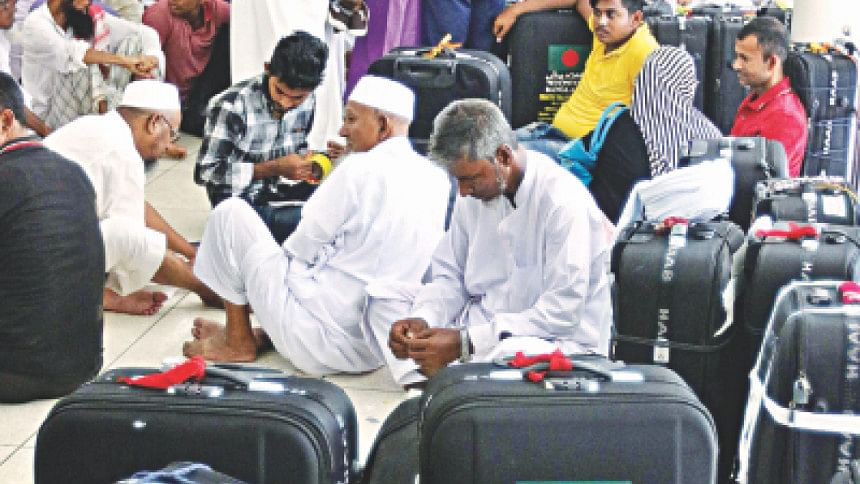
THE HAJJ FIASCO
Every year, Hajj pilgrims have to go through a lot of hassle before going to Hajj. But last year, a large number of Hajj pilgrims faced uncertainty over performing Hajj because of the private Hajj agencies' failure to collect visas and air tickets for the pilgrims on time. In 2017, a total of 1,27,198 pilgrims—4,200 under government management and 1,22,998 under private management—were scheduled to go to Saudi Arabia for performing Hajj.
One of the main reasons for the delay in visa processing was the imposition of an additional fee of 2,000 Saudi Riyal on repeat pilgrims by the Saudi Hajj authorities. The fact that the ministry of religious affairs did not know in advance about these extra fees added to the woes of the pilgrims. Biman Bangladesh Airlines had to cancel many of its scheduled flights due to shortage of passengers. The ministry of religious affairs gave an ultimatum to the agencies which failed to complete the visa-related procedures on time. Also, Biman Bangladesh Airlines had to arrange extra flights for Hajj pilgrims at the last moment.
Although the private Hajj agencies' inefficiency became evident in the whole episode, the religious ministry's failure in managing the entire procedure came under criticism during the months of July and August.
DHAKA STUNG BY CHIKUNGUNYA
Dhaka city saw the spread of Chikungunya disease for the first time in 2017. The outbreak of the disease raised a new public health concern in addition to dengue. The two city corporations as well as the health ministry had totally failed to act when it came to taking preventive measures to contain the outbreak of the disease. Like dengue, Chikungunya is contracted through mosquito bite. People from almost all parts of the city were affected by the disease. However, the worst affected were the residents of Kalabagan, Kathalbagan and Hatirpool areas.
As many as 566 people in the capital had been diagnosed with Chikungunya, according to the findings by the Institute of Epidemiology, Disease Control and Research (IEDCR), which conducted laboratory tests on patients from mid-April till the first week of July. According to an IEDCR newsletter, the number of Chikungunya patients was 519 in May-June with a peak of 95 people recorded positive in the fourth week of May alone.
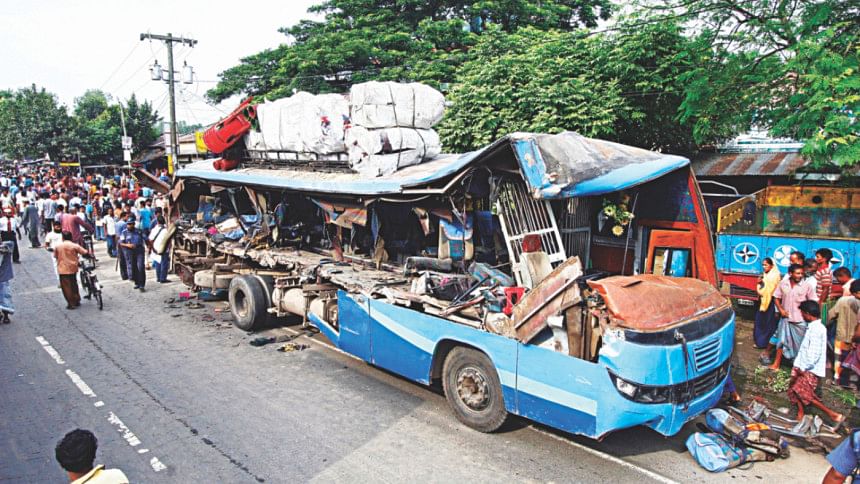
A SHARP RISE IN ROAD ACCIDENTS
On March 27 last year, the cabinet had approved the draft of Road Transport Act 2017. Although the draft law was welcomed by all, it did not include any provision for punishment for fatal accidents or accidents that cause severe injuries. The highest punishment for fatal road accidents is a three-year jail sentence.
News of road accidents made headlines in local newspapers throughout the year. The numbers of deaths from road accidents were particularly high during the two Eid festivals. The findings of Bangladesh Health Injury Survey (BHIS) 2016 were made public on February 16, 2017 which revealed that on average, 64 people die every day from injuries in traffic accidents. And National Committee to Protect Shipping, Roads and Railways (NCPSRR), an organisation campaigning for safety in the transport sector, said in a report that at least 2,297 people were killed and 5,480 injured in road accidents in the first six months of 2017, a sharp rise in the death toll compared to the same period in 2016.
However, on December 3, the High Court in a landmark verdict had ordered the bus owners, driver, and insurer to pay Tk 4.61 crore in compensation to the family of eminent filmmaker Tareque Masud for his death in a road accident in 2011. This is the first compensation trial held directly in the HC instead of a lower court in the country.
In her reaction after the verdict, Catherine Masud said, “It has been legally recognised that accidents are not merely an accident. The drivers, bus companies and even the insurance companies have the responsibility behind such accidents. We have sought redress under the law. I hope that many others will get compensation in the same way.”
LANGADU ATTACK
In 2017 we witnessed at least two major incidents of attacks on minority communities where the local authorities totally failed to contain the violence.
On June 2, at least four villages in Rangamati's Langadu upazila were torched by Bangalee settlers over the death of a local Jubo League leader Nurul Islam Nayan, the organising secretary of Langadu sadar union Jubo League, a pro-Awami League youth body. Bangalee settlers who carried out the attacks claimed that Nayan was killed by indigenous people while the indigenous people of the upazila refuted the claim. An elderly Chakma woman was hacked to death by the attackers. Following the attack, section 144 was imposed in the area, prohibiting large gatherings, yet several attacks were reported after that.
According to indigenous people, over 200 homes and shops were vandalised and burned to ashes after they were looted. Following the attack, some 300 Chakma families from three villages fled their homes. The victims and many locals believe that it was a planned attack to drive indigenous people out of the areas.
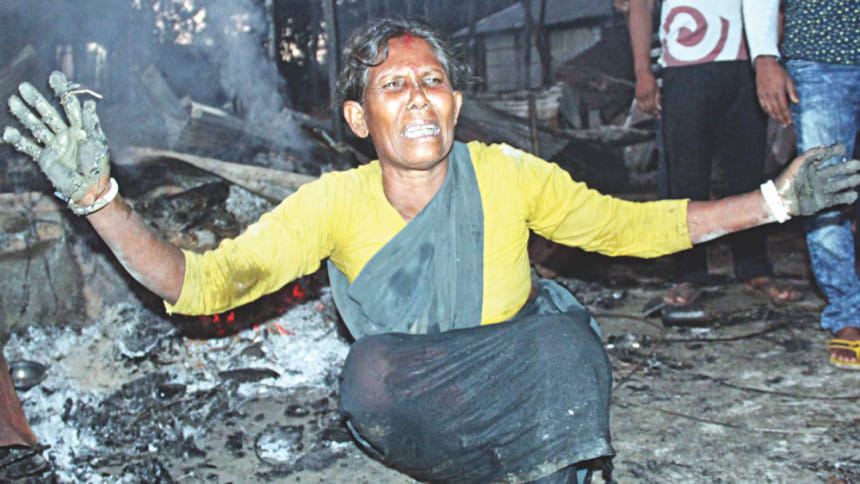
MAYHEM IN THAKURPARA HINDU VILLAGE
On November 10, violence flared up in Horkoli Thakurpara village of Rangpur over an alleged Facebook post “demeaning Islam” by a Hindu youth. At least 30 Hindu houses were burned and vandalised as religious zealots ran riot in the village and staged demonstrations blocking the Dinajpur-Rangpur highway. At least one person died in the violence.
According to law enforcers, digital evidence showed that the Facebook post was uploaded on October 28 from the account of Md Titu. After it came to the knowledge of the influential locals, they ran a hate campaign in the area. Announcements were made through loudspeakers and in local mosques since November 5 about holding protest rallies and forming human chains. Local people formed a human chain in protest of the Facebook post after offering the Jumma prayer on November 10. After that the situation became tense and around 10,000 to 12,000 people, carrying sticks and brickbats, marched towards Horkoli Thakurpara village where they vandalised Hindu houses and looted valuables.
The villagers alleged that the attack was carried out as per a plan and the local authorities did not do anything to prevent the attack. According to many, the attack was aimed at evicting the Hindus from their land. However, it was not confirmed if it was the alleged Facebook user who posted the anti-Islam content or whether his account was hacked.
THE CURIOUS CASE OF DISAPPEARANCES
The issue of enforced disappearance continued to dominate the headlines in 2017. According to data by Ain o Salish Kendra, from January to October, at least 50 people were reported to have been abducted. The fate of 12 of them could later be known.
In May, 15 people went missing within nine days in Jhenaidah, after law enforcement agencies had made some arrests and conducted raids.
In July, the alleged abduction and recovery of Farhad Mazhar, noted writer and poet, stirred controversy. Businessman Aniruddha Roy also went missing in August but returned in November. The cases of journalist Utpal Das and journalist and researcher Mubashar Hasan also triggered outcry late last year. Both of them returned as mysteriously as they had disappeared. One of the latest to disappear was Maroof Zaman, a former ambassador.
SECTION 57: OLD WINE IN A NEW BOTTLE?
Criticism over the much-talked-about Section 57 of ICT Act was far from fading away last year. In the first seven months of 2017, some 300 cases—including two dozen against journalists—were filed under the section, which many consider a draconian law designed to restrict freedom of speech. At the end of November, Information Minister Hasanul Haq Inu declared that the several contentious sections—including the Section 57—of the act would be repealed. However, several newspapers reported citing sources that the government would keep these sections in the Digital Security Act.


 For all latest news, follow The Daily Star's Google News channel.
For all latest news, follow The Daily Star's Google News channel. 



Comments